深圳中考复习-动词分类
图片预览
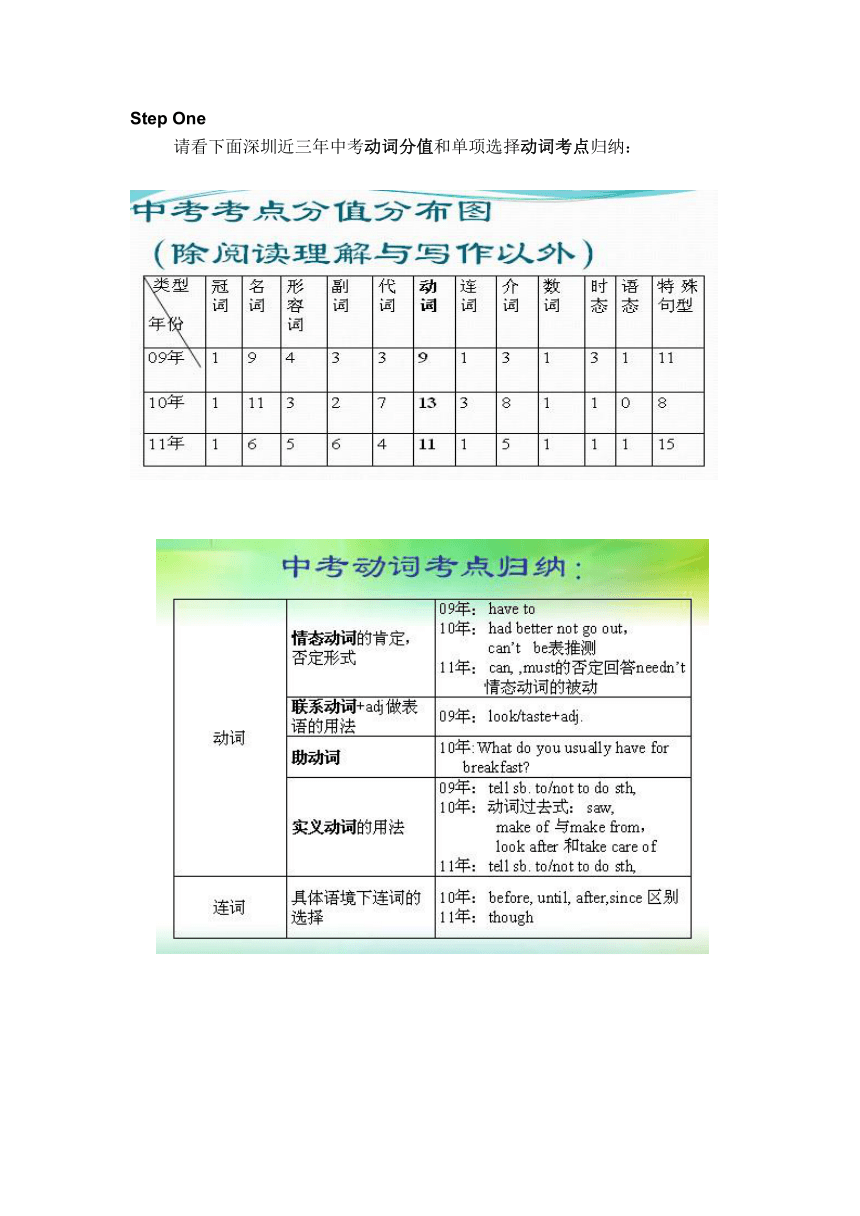
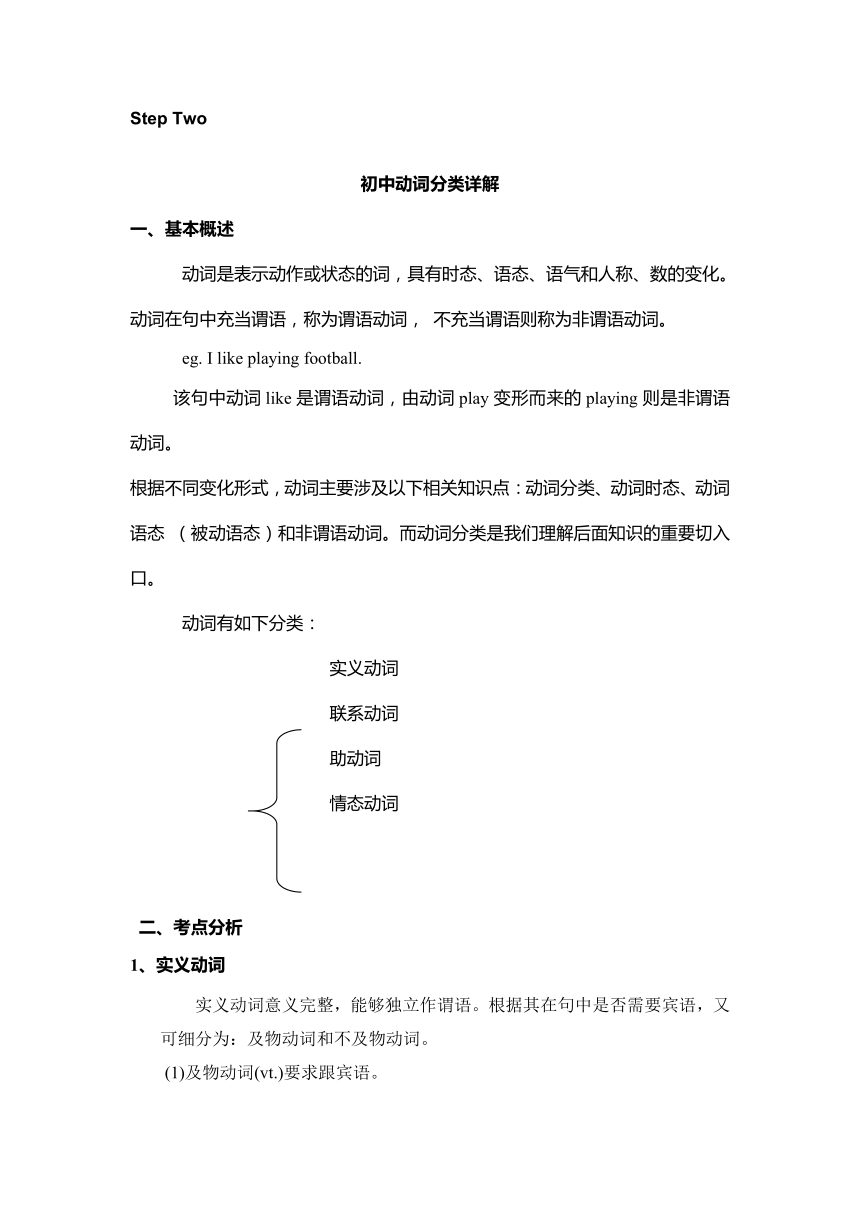
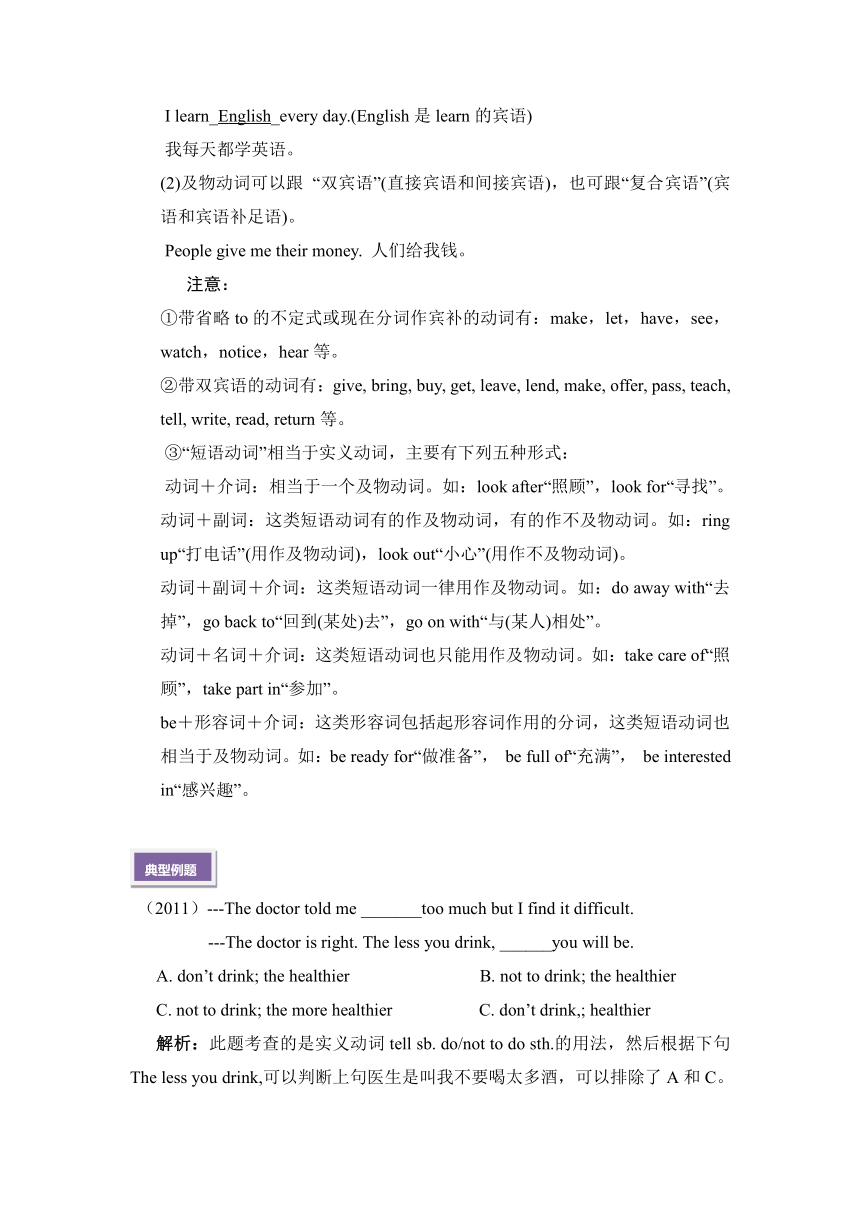
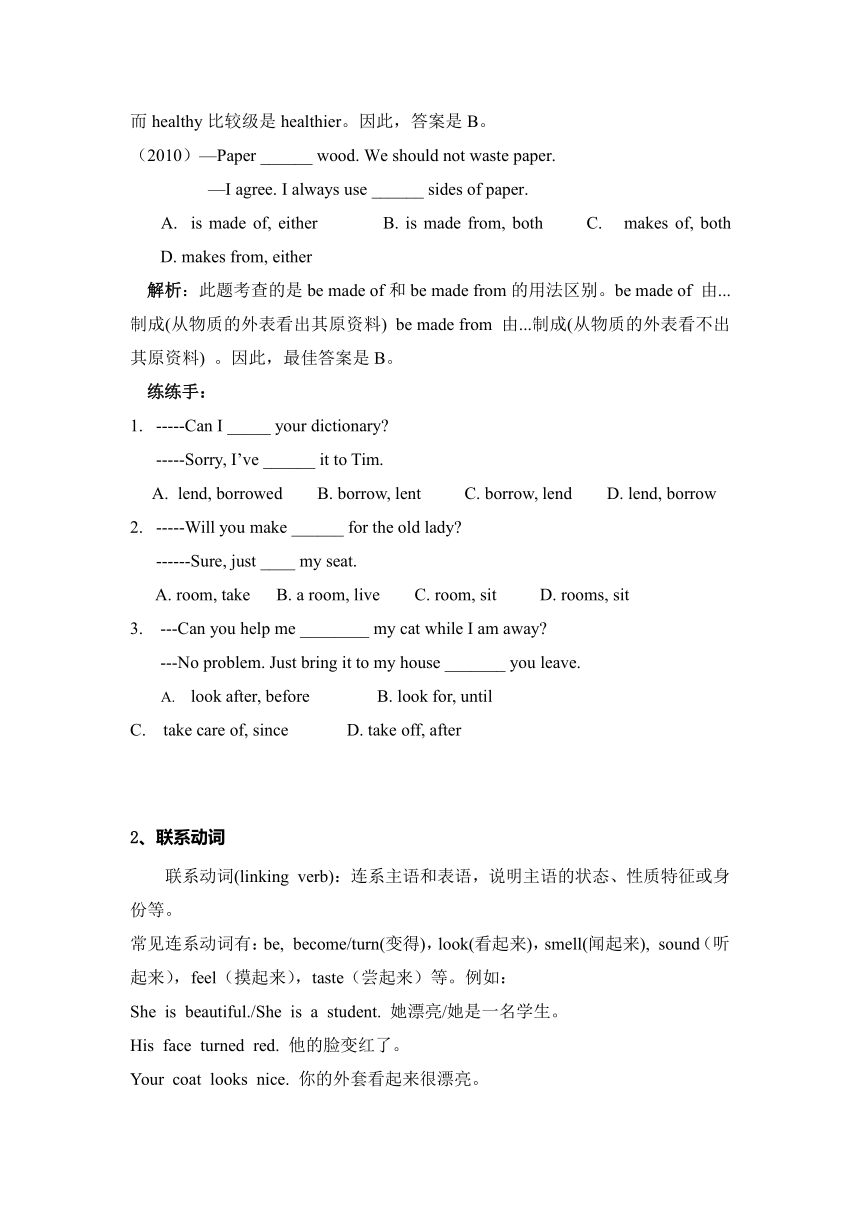
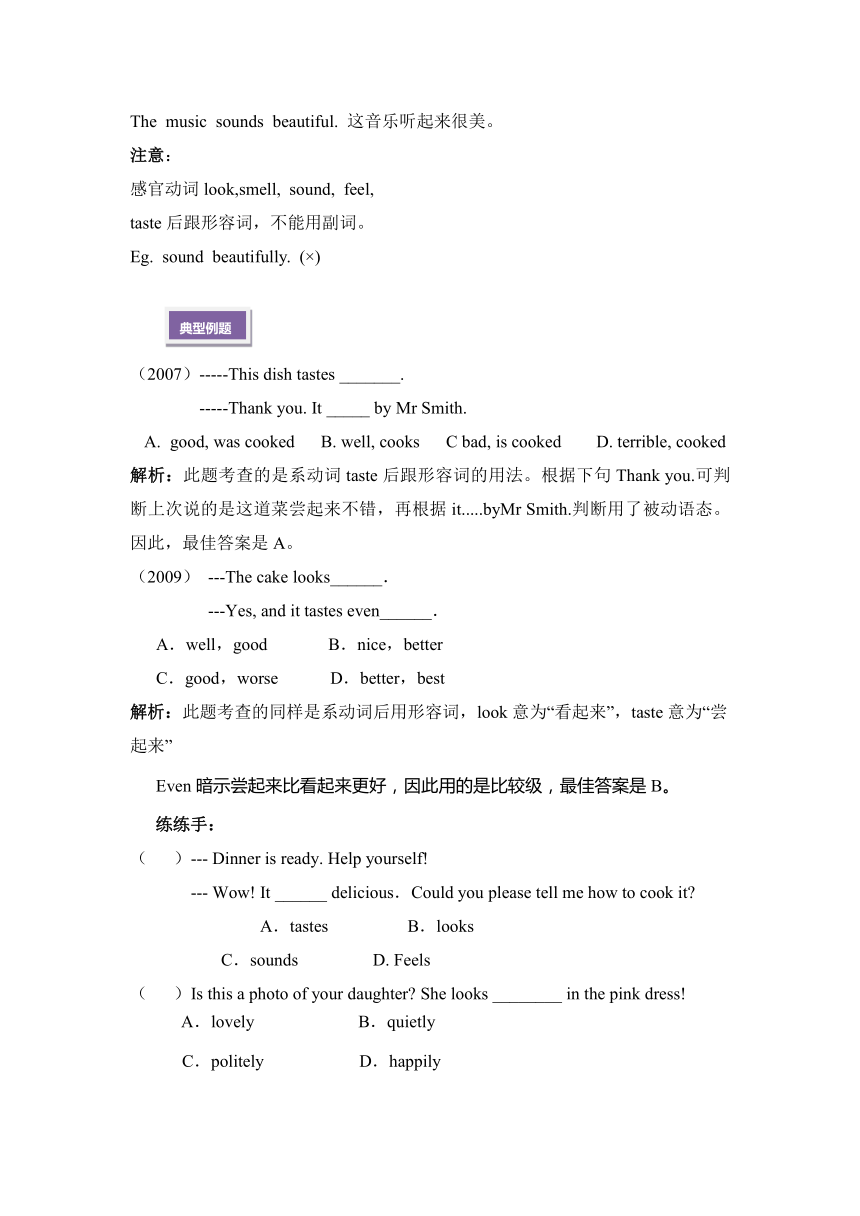
文档简介
Step One
请看下面深圳近三年中考动词分值和单项选择动词考点归纳:
Step Two
初中动词分类详解
一、基本概述
动词是表示动作或状态的词,具有时态、语态、语气和人称、数的变化。动词在句中充当谓语,称为谓语动词, 不充当谓语则称为非谓语动词。
eg. I like playing football.
该句中动词like是谓语动词,由动词play变形而来的playing则是非谓语动词。
根据不同变化形式,动词主要涉及以下相关知识点:动词分类、动词时态、动词语态 (被动语态)和非谓语动词。而动词分类是我们理解后面知识的重要切入口。
动词有如下分类:
实义动词
联系动词
助动词
情态动词
二、考点分析
1、实义动词
实义动词意义完整,能够独立作谓语。根据其在句中是否需要宾语,又可细分为:及物动词和不及物动词。
(1)及物动词(vt.)要求跟宾语。
I learn_English_every day.(English是learn的宾语)
我每天都学英语。
(2)及物动词可以跟 “双宾语”(直接宾语和间接宾语),也可跟“复合宾语”(宾语和宾语补足语)。
People give me their money. 人们给我钱。
注意:
①带省略to的不定式或现在分词作宾补的动词有:make,let,have,see,watch,notice,hear等。
②带双宾语的动词有:give, bring, buy, get, leave, lend, make, offer, pass, teach, tell, write, read, return等。
③“短语动词”相当于实义动词,主要有下列五种形式:
动词+介词:相当于一个及物动词。如:look after“照顾”,look for“寻找”。
动词+副词:这类短语动词有的作及物动词,有的作不及物动词。如:ring up“打电话”(用作及物动词),look out“小心”(用作不及物动词)。
动词+副词+介词:这类短语动词一律用作及物动词。如:do away with“去掉”,go back to“回到(某处)去”,go on with“与(某人)相处”。
动词+名词+介词:这类短语动词也只能用作及物动词。如:take care of“照顾”,take part in“参加”。
be+形容词+介词:这类形容词包括起形容词作用的分词,这类短语动词也相当于及物动词。如:be ready for“做准备”, be full of“充满”, be interested in“感兴趣”。
(2011)---The doctor told me _______too much but I find it difficult.
---The doctor is right. The less you drink, ______you will be.
A. don’t drink; the healthier B. not to drink; the healthier
C. not to drink; the more healthier C. don’t drink,; healthier
解析:此题考查的是实义动词tell sb. do/not to do sth.的用法,然后根据下句The less you drink,可以判断上句医生是叫我不要喝太多酒,可以排除了A和C。而healthy比较级是healthier。因此,答案是B。
(2010)—Paper ______ wood. We should not waste paper.
—I agree. I always use ______ sides of paper.
is made of, either B. is made from, both C. makes of, both D. makes from, either
解析:此题考查的是be made of和be made from的用法区别。be made of 由...制成(从物质的外表看出其原资料)
be made from 由...制成(从物质的外表看不出其原资料)
。因此,最佳答案是B。
练练手:
-----Can I _____ your dictionary
-----Sorry, I’ve ______ it to Tim.
lend, borrowed B. borrow, lent C. borrow, lend D. lend, borrow
-----Will you make ______ for the old lady
------Sure, just ____ my seat.
A. room, take B. a room, live C. room, sit D. rooms, sit
3. ---Can you help me ________ my cat while I am away
---No problem. Just bring it to my house _______ you leave.
look after, before B. look for, until
C. take care of, since D. take off, after
2、联系动词
联系动词(linking verb):连系主语和表语,说明主语的状态、性质特征或身份等。
常见连系动词有:be, become/turn(变得),look(看起来),smell(闻起来), sound(听起来),feel(摸起来),taste(尝起来)等。例如:
She is beautiful./She is a student. 她漂亮/她是一名学生。
His face turned red. 他的脸变红了。
Your coat looks nice. 你的外套看起来很漂亮。
The music sounds beautiful. 这音乐听起来很美。
注意:
感官动词look,smell, sound, feel,
taste后跟形容词,不能用副词。
Eg. sound beautifully. (×)
(2007)-----This dish tastes _______.
-----Thank you. It _____ by Mr Smith.
good, was cooked B. well, cooks C bad, is cooked D. terrible, cooked
解析:此题考查的是系动词taste后跟形容词的用法。根据下句Thank you.可判断上次说的是这道菜尝起来不错,再根据it.....byMr Smith.判断用了被动语态。因此,最佳答案是A。
(2009) ---The cake looks______.
---Yes, and it tastes even______.
A.well,good B.nice,better
C.good,worse D.better,best
解析:此题考查的同样是系动词后用形容词,look意为“看起来”,taste意为“尝起来”
Even暗示尝起来比看起来更好,因此用的是比较级,最佳答案是B。
练练手:
( )--- Dinner is ready. Help yourself!
--- Wow! It ______ delicious.Could you please tell me how to cook it
A.tastes B.looks
C.sounds D. Feels
( )Is this a photo of your daughter She looks ________ in the pink dress!
A.lovely B.quietly
C.politely D.happily
助动词
助动词无特殊意义,必须与行为动词或系动词连用构成谓语,帮助构成否定句、疑问句、正在进行时态、完成时态或被动语态等,常见助动词有be, do, have
We don‘t like the film. 我们不喜欢这部电影。 (用于否定句)
Tom is doing his homework. 汤姆正在做作业。 (用于正在进行时态)
He has finished his work. 他已经完成了工作。 (用于完成时态)
—What ________ you usually have for breakfast
—________ and a cup of coffee.
do, Three bread B. do, Three pieces of bread
C. are, Three breads D. are, Three piece of bread
解析:此题考查助动词do和后面have for breakfast的动词have共同构成谓语。而bread作为不可数名词,其可在量词上表示复数。因此,最佳答案是B。
练练手:
—It's dangerous to swim here. Look at the sign.
—Oh, I ________ notice it. Thanks for telling me.
A.haven't B.won't C.don't D.didn't
Mary with her sisters ________ Chinese in China.
A.are studying B.have studied
C.is studying D.study
I ________ the charity show on TV when the telephone rang.
A.watch B.watched
C.am watching D.was watching
4、情态动词
情态动词本身虽有意义,但不完整。它们表示说话人的能力、语气或情态等,如“可能”、“应当”。它们不能单独作谓语,必须与行为动词一起作谓语。情态动词多数没有人称和数的变化。主要有:can/could,may/might,must,need,dare,will/would,shall/should等。如:
I can dance.我会跳舞。
can的用法:①表示能力,意为“能、会”;②表示推测,意为“可能”;③表示请求允许,意为“可以”。以can开头的一般疑问句,其肯定和否定回答分别用can和can't。
—Look! The lights in the teachers' office are still on. Is Mr. Li working
—No. It ________ be Mr. Li. I saw him leave just now.
A.may not B.mustn't
C.can't D.needn't
(2)may 的用法:①表示请求、许可,意为“可以”;②表示猜测,意为“可能、也许”等。can与may均可用来征求意见或允许,意为“可以”,一般可互换使用;③以may开头的一般疑问句,其肯定回答应用may,而其否定回答则多用mustn't,而不用may not。
—Excuse me, can you tell me the way to the zoo
—Sorry, I'm new here. Please ask that policeman. He ______ know.
can B.need C.may
(3)must的用法:①表示“必须、应该”;②表示推测,“一定”。must表示推测时一般用于肯定句。在疑问句和否定句中一般应用can,否定句中也用may,但may not表示“可能不”,而can't表示“不可能”。否定句中,mustn't表示禁止,意为“不允许”;③以must开头的疑问句,肯定回答应用must,而否定回答则常用needn't,needn't表示“不需要、不必”,相当于don't have to。
①—Must I mop up the floor now
—No, you ________.
A.needn't B.can't
C.shouldn't D.mustn't
②—Must I answer this question in English
—No, you ________.
A.mustn't B.needn't
C.can't D.shouldn't
(4)need的用法:need 既可作情态动词,也可作实义动词。need作情态动词时,没有人称和数的变化,后跟动词原形,主要用于否定句和疑问句中。而need作实义动词时,有人称、数的变化,后接带to的不定式。
You needn't come to the meeting this afternoon if you have something important to do.
如果你有重要的事,下午的会就不必来了。
Does she need to come 她需要来吗?
注意:①比较can和be able to
两者表示能力时用法相同,但can只有现在式can和过去式could两种形式,其他时态要用be able to来表示。另外,be able to常常有做成了某件事的意味。
②must和can't
must用在肯定句中表示较有把握的推测,意为“一定”。推测的否定形式,疑问形式用can't, couldn't表示。 如:
He must be working in his office.
他一定在办公室工作呢。
Mike can't have found his car, for he came to work by bus this morning.
迈克一定还没有找回他的车,因为早上他是坐公共汽车来上班的。
练练手:
1. ---Must I return the book this week
---No, you ______. You can ______it for 20 days.
A. mustn’t; keep B. needn’t; borrow
C. needn’t; keep D. mustn’t; borrow
2.---Can I go fishing witll you.Dad
---No,you_____.You_______stay at home and do your homework first.
A.won’t,may B.can’t,must
C.shouldn’t,ought D.needn’t,should
Step Three: 巩固练习
(A)
一、单项选择
1. - ----You ______ sleep in class.
----Sorry, Miss Wang. I____.
mustn’t, mustn’t B. can’t; needn’t
C. mustn’t , won’t D. shouldn’t, may not
2.---Can you_____your camera to me,Mike
---Sorry.I_____it at home.
A.borrow,left B.borrow,forgot
C.1end,forgot D.1end,left
3. ---Dad, why should I stop______computer games
---For your health, my boy, I’m afraid you______.
A.to play,must B.playing,have to
C.to play,can D.playing,may
4. ---Mary, would you like to ________ this game
---I’d love to, but I have to finish ________ the composition first.
A.join in, to write B. attend, writing
C. join, to write D. take part in, writing
5. ---The weather report says there is going to ________ a typhoon tonight.
---So we had better ________ out.
be, not go B. have, not go C. be, not to go D. have, not to go
6. ---Is Mr. Smith in his office now
---No, he _______ there. I _______him in the library a minute ago.
may be, saw B. can’t be, see C. mustn’t be, see D. can’t be, saw
7. ---Have you ever ______ Australia
---Yes, I have. It’s really interesting _______ with kangaroos.
been to, to play B. gone to, played
C. been to, play D. gone to, playing
8. ---Do you often go swimming ______Sunday mornings
---Yes. Why not ________with me this Sunday
A. on, go B. in, to go C. on, going D. in, going
9. ---When should I hand in my paper
---Your paper must _____as soon as the bell ________.
A. hand in; rings B.hand in; will ring
C be handed in; will ring D. be handed in; rings
10. ----How many students are there in your class
----Fifty. Two-thirds of us______ from Guangdong.
. A. is B. comes C. are D. coming
11. ----Would you like ______ some coffee
----No, thanks. I _____ some.
have, already have B. had, just bad
C.having, have yet had D. to have, have already had
12. There is going to __ a football match tomorrow afternoon.
--- Great! Can we go and watch it ----- I hope so.
Is B. have C. be D. has
(B)
二、阅读理解
Mr. King worked in a factory. He liked playing soccer and spent much time on it, so he was sometimes late for work. His boss was so angry that he fired Mr. King. Mr. King couldn’t find another job. Finally he got into trouble and lived a difficult life.
One of his friends felt sorry for him and introduced him to a headmaster, whose school was just in need of swimming coaches. Mr. King began to teach the school children to swim. He wasn’t a good coach. Two months later, the children learned nothing. Few of them could swim.
It was a hot Saturday. The children wouldn’t stay in the classroom and wanted to swim in the river. Mr. King failed to stop them. Before they started, he drew a red line below the knee of each child. He said to them, “Come out of the river at once if the water reaches the line.”
根据短文内容,选择最佳答案。(共5小题,每小题2分,满分10分)
1. Why did the boss fire Mr. King
A. Because Mr. King didn’t like his job. B. Because Mr. King was ill.
C. Because Mr. King talked too much. D. Because Mr. King was sometimes late for work.
2. Mr. King couldn’t find another job and his life was ________.
A. happy B. hard C. relaxing D. free
3. Who helped Mr. King find a job in a school
A. The boss of the factory B. His friend C. The school children D. Nobody
4. Two months later, the children learned nothing because ________.
A. Mr. King taught them to play soccer B. they didn’t like swimming at all
C. they were afraid of water D. Mr. King was a poor coach
5. Mr. King _______, so he drew a red line below the knee of each child.
A. didn’t want the children to swim B. wanted to make the children look funny
C. wanted to make the children happy D. wanted to help the children swim better
Step Four: 总结
我们来回顾一下,动词分类及其所考查的知识点。
实义动词
_______________________________
_______________________________
_______________________________
_______________________________
系动词:
_______________________________
_______________________________
_______________________________
_______________________________
助动词:
_______________________________
_______________________________
_______________________________
_______________________________
情态动词:
_______________________________
_______________________________
_______________________________
_______________________________
典型例题
典型例题
典型例题
典型例题
典型例题
典型例题
请看下面深圳近三年中考动词分值和单项选择动词考点归纳:
Step Two
初中动词分类详解
一、基本概述
动词是表示动作或状态的词,具有时态、语态、语气和人称、数的变化。动词在句中充当谓语,称为谓语动词, 不充当谓语则称为非谓语动词。
eg. I like playing football.
该句中动词like是谓语动词,由动词play变形而来的playing则是非谓语动词。
根据不同变化形式,动词主要涉及以下相关知识点:动词分类、动词时态、动词语态 (被动语态)和非谓语动词。而动词分类是我们理解后面知识的重要切入口。
动词有如下分类:
实义动词
联系动词
助动词
情态动词
二、考点分析
1、实义动词
实义动词意义完整,能够独立作谓语。根据其在句中是否需要宾语,又可细分为:及物动词和不及物动词。
(1)及物动词(vt.)要求跟宾语。
I learn_English_every day.(English是learn的宾语)
我每天都学英语。
(2)及物动词可以跟 “双宾语”(直接宾语和间接宾语),也可跟“复合宾语”(宾语和宾语补足语)。
People give me their money. 人们给我钱。
注意:
①带省略to的不定式或现在分词作宾补的动词有:make,let,have,see,watch,notice,hear等。
②带双宾语的动词有:give, bring, buy, get, leave, lend, make, offer, pass, teach, tell, write, read, return等。
③“短语动词”相当于实义动词,主要有下列五种形式:
动词+介词:相当于一个及物动词。如:look after“照顾”,look for“寻找”。
动词+副词:这类短语动词有的作及物动词,有的作不及物动词。如:ring up“打电话”(用作及物动词),look out“小心”(用作不及物动词)。
动词+副词+介词:这类短语动词一律用作及物动词。如:do away with“去掉”,go back to“回到(某处)去”,go on with“与(某人)相处”。
动词+名词+介词:这类短语动词也只能用作及物动词。如:take care of“照顾”,take part in“参加”。
be+形容词+介词:这类形容词包括起形容词作用的分词,这类短语动词也相当于及物动词。如:be ready for“做准备”, be full of“充满”, be interested in“感兴趣”。
(2011)---The doctor told me _______too much but I find it difficult.
---The doctor is right. The less you drink, ______you will be.
A. don’t drink; the healthier B. not to drink; the healthier
C. not to drink; the more healthier C. don’t drink,; healthier
解析:此题考查的是实义动词tell sb. do/not to do sth.的用法,然后根据下句The less you drink,可以判断上句医生是叫我不要喝太多酒,可以排除了A和C。而healthy比较级是healthier。因此,答案是B。
(2010)—Paper ______ wood. We should not waste paper.
—I agree. I always use ______ sides of paper.
is made of, either B. is made from, both C. makes of, both D. makes from, either
解析:此题考查的是be made of和be made from的用法区别。be made of 由...制成(从物质的外表看出其原资料)
be made from 由...制成(从物质的外表看不出其原资料)
。因此,最佳答案是B。
练练手:
-----Can I _____ your dictionary
-----Sorry, I’ve ______ it to Tim.
lend, borrowed B. borrow, lent C. borrow, lend D. lend, borrow
-----Will you make ______ for the old lady
------Sure, just ____ my seat.
A. room, take B. a room, live C. room, sit D. rooms, sit
3. ---Can you help me ________ my cat while I am away
---No problem. Just bring it to my house _______ you leave.
look after, before B. look for, until
C. take care of, since D. take off, after
2、联系动词
联系动词(linking verb):连系主语和表语,说明主语的状态、性质特征或身份等。
常见连系动词有:be, become/turn(变得),look(看起来),smell(闻起来), sound(听起来),feel(摸起来),taste(尝起来)等。例如:
She is beautiful./She is a student. 她漂亮/她是一名学生。
His face turned red. 他的脸变红了。
Your coat looks nice. 你的外套看起来很漂亮。
The music sounds beautiful. 这音乐听起来很美。
注意:
感官动词look,smell, sound, feel,
taste后跟形容词,不能用副词。
Eg. sound beautifully. (×)
(2007)-----This dish tastes _______.
-----Thank you. It _____ by Mr Smith.
good, was cooked B. well, cooks C bad, is cooked D. terrible, cooked
解析:此题考查的是系动词taste后跟形容词的用法。根据下句Thank you.可判断上次说的是这道菜尝起来不错,再根据it.....byMr Smith.判断用了被动语态。因此,最佳答案是A。
(2009) ---The cake looks______.
---Yes, and it tastes even______.
A.well,good B.nice,better
C.good,worse D.better,best
解析:此题考查的同样是系动词后用形容词,look意为“看起来”,taste意为“尝起来”
Even暗示尝起来比看起来更好,因此用的是比较级,最佳答案是B。
练练手:
( )--- Dinner is ready. Help yourself!
--- Wow! It ______ delicious.Could you please tell me how to cook it
A.tastes B.looks
C.sounds D. Feels
( )Is this a photo of your daughter She looks ________ in the pink dress!
A.lovely B.quietly
C.politely D.happily
助动词
助动词无特殊意义,必须与行为动词或系动词连用构成谓语,帮助构成否定句、疑问句、正在进行时态、完成时态或被动语态等,常见助动词有be, do, have
We don‘t like the film. 我们不喜欢这部电影。 (用于否定句)
Tom is doing his homework. 汤姆正在做作业。 (用于正在进行时态)
He has finished his work. 他已经完成了工作。 (用于完成时态)
—What ________ you usually have for breakfast
—________ and a cup of coffee.
do, Three bread B. do, Three pieces of bread
C. are, Three breads D. are, Three piece of bread
解析:此题考查助动词do和后面have for breakfast的动词have共同构成谓语。而bread作为不可数名词,其可在量词上表示复数。因此,最佳答案是B。
练练手:
—It's dangerous to swim here. Look at the sign.
—Oh, I ________ notice it. Thanks for telling me.
A.haven't B.won't C.don't D.didn't
Mary with her sisters ________ Chinese in China.
A.are studying B.have studied
C.is studying D.study
I ________ the charity show on TV when the telephone rang.
A.watch B.watched
C.am watching D.was watching
4、情态动词
情态动词本身虽有意义,但不完整。它们表示说话人的能力、语气或情态等,如“可能”、“应当”。它们不能单独作谓语,必须与行为动词一起作谓语。情态动词多数没有人称和数的变化。主要有:can/could,may/might,must,need,dare,will/would,shall/should等。如:
I can dance.我会跳舞。
can的用法:①表示能力,意为“能、会”;②表示推测,意为“可能”;③表示请求允许,意为“可以”。以can开头的一般疑问句,其肯定和否定回答分别用can和can't。
—Look! The lights in the teachers' office are still on. Is Mr. Li working
—No. It ________ be Mr. Li. I saw him leave just now.
A.may not B.mustn't
C.can't D.needn't
(2)may 的用法:①表示请求、许可,意为“可以”;②表示猜测,意为“可能、也许”等。can与may均可用来征求意见或允许,意为“可以”,一般可互换使用;③以may开头的一般疑问句,其肯定回答应用may,而其否定回答则多用mustn't,而不用may not。
—Excuse me, can you tell me the way to the zoo
—Sorry, I'm new here. Please ask that policeman. He ______ know.
can B.need C.may
(3)must的用法:①表示“必须、应该”;②表示推测,“一定”。must表示推测时一般用于肯定句。在疑问句和否定句中一般应用can,否定句中也用may,但may not表示“可能不”,而can't表示“不可能”。否定句中,mustn't表示禁止,意为“不允许”;③以must开头的疑问句,肯定回答应用must,而否定回答则常用needn't,needn't表示“不需要、不必”,相当于don't have to。
①—Must I mop up the floor now
—No, you ________.
A.needn't B.can't
C.shouldn't D.mustn't
②—Must I answer this question in English
—No, you ________.
A.mustn't B.needn't
C.can't D.shouldn't
(4)need的用法:need 既可作情态动词,也可作实义动词。need作情态动词时,没有人称和数的变化,后跟动词原形,主要用于否定句和疑问句中。而need作实义动词时,有人称、数的变化,后接带to的不定式。
You needn't come to the meeting this afternoon if you have something important to do.
如果你有重要的事,下午的会就不必来了。
Does she need to come 她需要来吗?
注意:①比较can和be able to
两者表示能力时用法相同,但can只有现在式can和过去式could两种形式,其他时态要用be able to来表示。另外,be able to常常有做成了某件事的意味。
②must和can't
must用在肯定句中表示较有把握的推测,意为“一定”。推测的否定形式,疑问形式用can't, couldn't表示。 如:
He must be working in his office.
他一定在办公室工作呢。
Mike can't have found his car, for he came to work by bus this morning.
迈克一定还没有找回他的车,因为早上他是坐公共汽车来上班的。
练练手:
1. ---Must I return the book this week
---No, you ______. You can ______it for 20 days.
A. mustn’t; keep B. needn’t; borrow
C. needn’t; keep D. mustn’t; borrow
2.---Can I go fishing witll you.Dad
---No,you_____.You_______stay at home and do your homework first.
A.won’t,may B.can’t,must
C.shouldn’t,ought D.needn’t,should
Step Three: 巩固练习
(A)
一、单项选择
1. - ----You ______ sleep in class.
----Sorry, Miss Wang. I____.
mustn’t, mustn’t B. can’t; needn’t
C. mustn’t , won’t D. shouldn’t, may not
2.---Can you_____your camera to me,Mike
---Sorry.I_____it at home.
A.borrow,left B.borrow,forgot
C.1end,forgot D.1end,left
3. ---Dad, why should I stop______computer games
---For your health, my boy, I’m afraid you______.
A.to play,must B.playing,have to
C.to play,can D.playing,may
4. ---Mary, would you like to ________ this game
---I’d love to, but I have to finish ________ the composition first.
A.join in, to write B. attend, writing
C. join, to write D. take part in, writing
5. ---The weather report says there is going to ________ a typhoon tonight.
---So we had better ________ out.
be, not go B. have, not go C. be, not to go D. have, not to go
6. ---Is Mr. Smith in his office now
---No, he _______ there. I _______him in the library a minute ago.
may be, saw B. can’t be, see C. mustn’t be, see D. can’t be, saw
7. ---Have you ever ______ Australia
---Yes, I have. It’s really interesting _______ with kangaroos.
been to, to play B. gone to, played
C. been to, play D. gone to, playing
8. ---Do you often go swimming ______Sunday mornings
---Yes. Why not ________with me this Sunday
A. on, go B. in, to go C. on, going D. in, going
9. ---When should I hand in my paper
---Your paper must _____as soon as the bell ________.
A. hand in; rings B.hand in; will ring
C be handed in; will ring D. be handed in; rings
10. ----How many students are there in your class
----Fifty. Two-thirds of us______ from Guangdong.
. A. is B. comes C. are D. coming
11. ----Would you like ______ some coffee
----No, thanks. I _____ some.
have, already have B. had, just bad
C.having, have yet had D. to have, have already had
12. There is going to __ a football match tomorrow afternoon.
--- Great! Can we go and watch it ----- I hope so.
Is B. have C. be D. has
(B)
二、阅读理解
Mr. King worked in a factory. He liked playing soccer and spent much time on it, so he was sometimes late for work. His boss was so angry that he fired Mr. King. Mr. King couldn’t find another job. Finally he got into trouble and lived a difficult life.
One of his friends felt sorry for him and introduced him to a headmaster, whose school was just in need of swimming coaches. Mr. King began to teach the school children to swim. He wasn’t a good coach. Two months later, the children learned nothing. Few of them could swim.
It was a hot Saturday. The children wouldn’t stay in the classroom and wanted to swim in the river. Mr. King failed to stop them. Before they started, he drew a red line below the knee of each child. He said to them, “Come out of the river at once if the water reaches the line.”
根据短文内容,选择最佳答案。(共5小题,每小题2分,满分10分)
1. Why did the boss fire Mr. King
A. Because Mr. King didn’t like his job. B. Because Mr. King was ill.
C. Because Mr. King talked too much. D. Because Mr. King was sometimes late for work.
2. Mr. King couldn’t find another job and his life was ________.
A. happy B. hard C. relaxing D. free
3. Who helped Mr. King find a job in a school
A. The boss of the factory B. His friend C. The school children D. Nobody
4. Two months later, the children learned nothing because ________.
A. Mr. King taught them to play soccer B. they didn’t like swimming at all
C. they were afraid of water D. Mr. King was a poor coach
5. Mr. King _______, so he drew a red line below the knee of each child.
A. didn’t want the children to swim B. wanted to make the children look funny
C. wanted to make the children happy D. wanted to help the children swim better
Step Four: 总结
我们来回顾一下,动词分类及其所考查的知识点。
实义动词
_______________________________
_______________________________
_______________________________
_______________________________
系动词:
_______________________________
_______________________________
_______________________________
_______________________________
助动词:
_______________________________
_______________________________
_______________________________
_______________________________
情态动词:
_______________________________
_______________________________
_______________________________
_______________________________
典型例题
典型例题
典型例题
典型例题
典型例题
典型例题
同课章节目录
- 词法
- 名词
- 动词和动词短语
- 动词语态
- 动词时态
- 助动词和情态动词
- 非谓语动词
- 冠词
- 代词
- 数词和量词
- 形容词副词及其比较等级
- 介词和介词短语
- 连词和感叹词
- 构词法
- 相似、相近词比较
- 句法
- 陈述句
- 一般疑问句和否定疑问句
- 特殊疑问句及选择疑问句
- 反意疑问句
- 存在句(There be句型)
- 宾语从句
- 定语从句
- 状语从句
- 主谓一致问题
- 简单句
- 并列句
- 复合句
- 主谓一致
- 主、表语从句
- 名词性从句
- 直接引语和间接引语
- 虚拟语气
- 感叹句
- 强调句
- 倒装句
- 祈使句
- 句子的成分
- 句子的分类
- 题型专区
- 单项选择部分
- 易错题
- 完形填空
- 阅读理解
- 词汇练习
- 听说训练
- 句型转换
- 补全对话
- 短文改错
- 翻译
- 书面表达
- 任务型阅读
- 语法填空
- 其他资料
